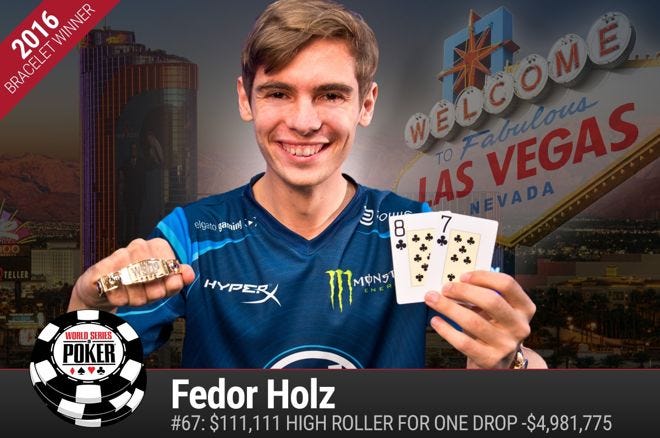Why Momentum Matters
It's the currency of the startup ecosystem, for both founders and investors
When I was a high-stakes tournament poker player, one of the most common sources of debate was around the subject of momentum. Objectively, it seemed illogical that players could go on hot streaks: tournaments often came down to big, unavoidable coinflips (eg: QQ vs AK) or coolers (running KK in to AA). However well you had done in the most recent tournaments obviously had zero impact on your probability in those scenarios.
Yet time and time again, players would seem to have an “annus mirabilis” where it seemed almost impossible to beat them, whether it was Dan Colman in 2014, Fedor Holz in 2016, or Justin Bonomo in 2018. I had my own mini-version of this hot streak when I cashed for nearly two million dollars with two wins and five podium finishes in the span of six months, culminating with a GPI rank of #2 in the world in early 2015.
Why does this happen? It’s hard to fully explain, but any true competitor knows that feeling of supreme confidence when things are clicking. Your field of vision is clear and everything seems to slow down: the hoop looks huge, you see the tight window to fit the ball into your wide receiver, or you dare a risky drop shot. In poker, it was making the big bluff or big fold when the math said to do something else.
Some of this is also psychological with your opponents: they’re afraid of you, play passively, and let you dominate them.
Everyone knows that startups live and die by momentum. Sam Altman wrote a great blog a few years ago, teaching founders how to avoid the “post-YC slump.”
“Momentum is everything in a startup. If you have momentum, you can survive most other problems. If you do not have momentum, nothing except getting momentum will solve your problems.”
-Sam Altman
I recently heard a great spin on that take from Glenn Solomon of Notable Capital where he shared his view about how founders should think about this topic: momentum management is critical as the CEO. If you raise a round at too high of a price and the market turns or you fail to deliver on your plan, momentum now swings against you, cascading the other way, and it’s almost impossible to recover.
The best founders create, nurture, and manage momentum.
More recently, I’ve realized that momentum isn’t just the currency of startups, it’s the currency of this entire ecosystem. Venture funds ALSO have momentum. Individual investors have momentum. These things ebb and flow over time, but when a fund or investor loses it, it’s very, very hard to recover. It often takes a complete reinvention1 or going further out on the risk curve and hoping to be lucky and right.
Any savvy investor who knows the venture industry should be able to think of 1-2 recent examples of funds that regained momentum after losing it, but perhaps more easily, the many, many funds that lost momentum and never recovered. Venture funds take a long time to die so many are still around and investing, but they’re largely irrelevant or non-competitive for the best investments.
Why does momentum matter for investing? Brand and relevancy is an obvious one, but perhaps more subtly, from a performance psychology perspective, I think that when investors lose their confidence, it’s very hard for them to make high-conviction investments. They retreat to what feels safer, afraid of making a mistake. They start losing investments even when they do issue term sheets, when other investors are able to press their advantage and rising momentum to win competitive deals. A dirty secret is that many competitive processes are not firm-vs-firm, but person-vs-person, where it comes down to the individual partners at each fund battling for the right to invest.
On the flip side, I wrote last year about Thrive’s investment in OpenAI. Whatever you think of that investment, that investment coupled with their investment in Stripe speaks of supreme confidence, of a fund that’s on a huge upswing, believes in itself, and thinks that it’s going to be the dominant fund over the next decade. That’s momentum.
Personally, when I think of my last two investments, I’m honestly not sure I would’ve had the confidence to make them two years ago. They’re both extremely contrarian. Many VCs who heard the pitch said “This is crazy” or “That’s never going to work.” But the insane momentum from the first three investments I made over the last eighteen months has given me the confidence to trust my instincts and belief in the founders, their vision, and the radical full potential of those companies.
“Pride goeth before destruction, and a haughty spirit before a fall.”
Proverbs 16:18
A note of caution: overconfidence can lead to downfall. It doesn’t take much imagination to think of venture funds or investors who were flying high and then suddenly lost momentum. As Mike Moritz once said, “We’re only as good as our next investment at Sequoia.” Pride and complacency is the easiest way to have a sudden reversal of fortune.
Venture, like poker or other high-stakes competitive sports, requires world-class performance psychology and mastery over oneself.
Thanks to Bella Garcia-Camargo who made a comment at last night’s Susa Venture Fellows Program mixer (applications open now!) that finally crystallized my thinking on this topic. Thanks also to Chad Byers, Greg Rosen, Geoff Lewis, Glenn Solomon, and other friends for conversations that sparked the original noodling that led to this article.
If you’re a spiky founder building an N-of-1 company twelve to thirty-six months before it would appear on a market map, reach out to pratyush [at] susaventures [dot] com.
Usually involving changing the entire investment team, shifting sector focus dramatically, etc.


